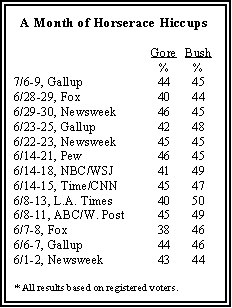Poll-watchers hoping to learn now how the presidential election will turn out this fall are going to be disappointed. While Texas Gov. George W. Bush has often held the lead over Vice President Al Gore since the end of primary season, Bush’s advantage has been fleeting. More often than not, it is here one day gone the next!
 Just recently, Bush pulled ahead in several polls taken just after a new controversy arose over Gore’s alleged fund-raising improprieties in 1996. But subsequent (and more recent) surveys by the Gallup Organization and Newsweek once again find the race about even. Gallup’s latest sounding, taken July 6-9, showed the two men in an even race (Bush leading 45%-44%). That poll received far less attention than the previous Gallup survey (conducted June 23-25, just after the fund-raising story broke), which showed Bush moving out to a six-point lead.
Just recently, Bush pulled ahead in several polls taken just after a new controversy arose over Gore’s alleged fund-raising improprieties in 1996. But subsequent (and more recent) surveys by the Gallup Organization and Newsweek once again find the race about even. Gallup’s latest sounding, taken July 6-9, showed the two men in an even race (Bush leading 45%-44%). That poll received far less attention than the previous Gallup survey (conducted June 23-25, just after the fund-raising story broke), which showed Bush moving out to a six-point lead.
This pattern has not changed since Bush and Gore wrapped up their parties’ nominations in March. Virtually all national surveys of registered voters since then have either had the race even or Bush leading. The GOP standard-bearer has been ahead by a statistically-significant margin in 19 of 39 national polls conducted since the Super Tuesday primaries on March 8; 19 were statistical draws. Gore led in just one poll and that was back in March.
The fluctuation in poll results reflects a lack of conviction among voters, fueled in part by the fact that fewer Americans are paying attention than at this point in either the 1996 or 1992 campaigns. In the latest Pew Research Center survey, for instance, just 46% said they had given a good deal of thought to the election. That compares to 55% at a comparable point in 1996 and 63% in 1992.
Despite the volatility and voter indifference, however, there seems little doubt that the trend spells bad news for the vice president. Although he has remained within striking distance of Bush, his campaign has failed to strike much of a chord, even among fellow Democrats. In the Pew survey, fewer than half of the Democrats (47%) who back Gore support him strongly, compared to 56% of GOP partisans who back Bush strongly.
While Gore is having his problems, the variability and softness in the national surveys suggest that it is way too early to write him off, which is exactly what some analysts have done every time a new poll comes out showing him trailing. The public is similarly skeptical about his chances in November — 51% think Bush will win, while 34% believe Gore will prevail.
But Gore is getting much more respect from the voters than Bob Dole did four years ago, when 71% predicted he would be defeated by President Clinton. The polls at that time presented a very different picture. Clinton held a statistically-significant lead in 29 nationwide surveys from the middle of March until mid-July 1996.
This is a far less predictable race in its early stages. The number of undecided voters is up from 1996, and fewer have ruled out voting for either of the candidates. Despite what you read and hear, it is very likely that voter preferences will not settle down until after this fall’s debates, and perhaps not until Election Day itself.


